#fiction: luke crain
Photo
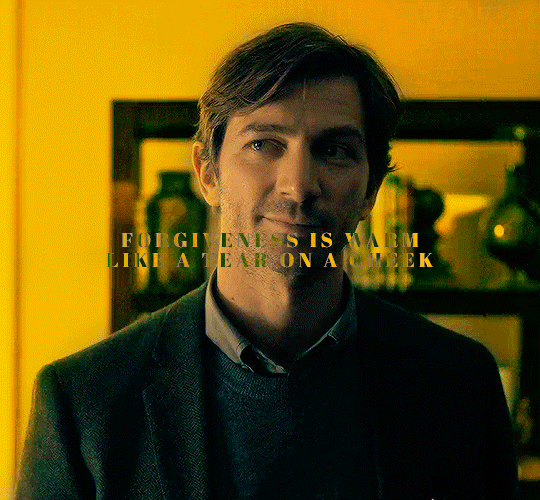


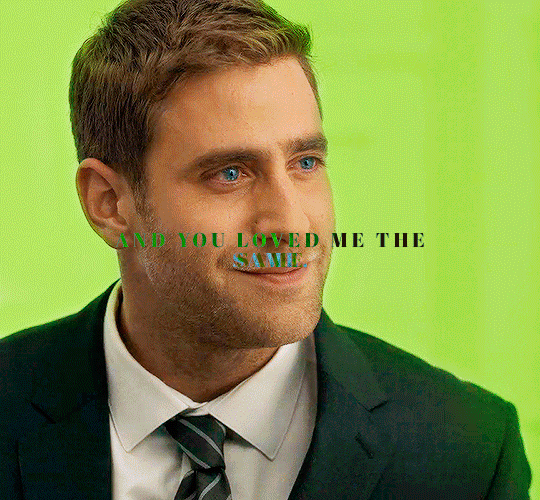
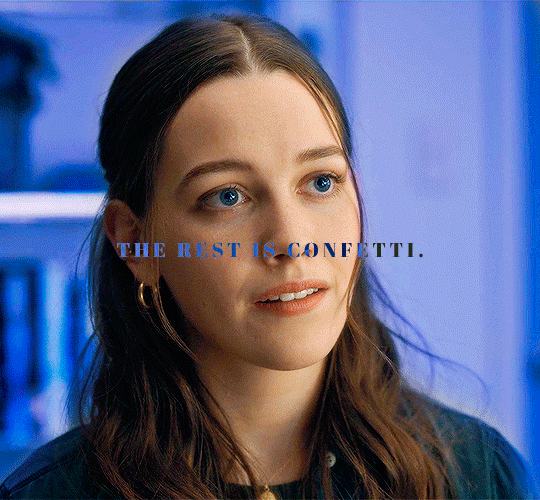
THE HAUNTING OF HILL HOUSE
dir. Mike Flanagan (2018)
#show: the haunting of hill house#fav: victoria pedretti#fiction: nell crain#fiction: luke crain#fiction: theo crain#fiction: shirley crain#fiction: steve crain#the haunting of hill house#thohh#victoria pedretti#kate siegel#oliver jackson cohen#michiel huisman#elizabeth reaser#gif#photoset#dailynetflix#tvcentric#tuserpau#cinematv#filmtvdaily#thehauntingsource
792 notes
·
View notes
Note
hi mike, saw someone say your ask box was open and i came running! have you ever had any ideas as to how the crain family would be getting on now a few years later/what they're doing? it's always in the back of my mind wondering if creators also wonder about those sort of things themselves once their project has ended. thanks so much & hope you have a great day!
I do think about that. Quite a lot, actually.
The Crains took on lives of their own for me. I'd never written long form before, so it was the first time I lived with the same characters for that long, and for such extended arcs. Here's where I think they are, a few years later:
Shirley: I think that Shirley and her husband overcame her disclosure of infidelity. She'd been closed off for so long, after the series ended I think she found some peace in her life and opened herself up to her marriage. I think she also began to find kindness again. They ran the funeral home together, but Shirley found purpose in helping people handle grief and loss with empathy and kindness. Her oldest would be just about ready to start college now, and I think that would have her looking back and realizing that she always remembered her childhood as seemingly endless... but now she sees just how fast it truly goes by.
Luke: Luke stayed sober. He's six years into it now, and it's gone so well that he's also become a sponsor. That doesn't mean he's immune to the struggle, far from it. He still walks up to that edge sometimes. Oddly, it's in those moments that the "Twin Thing" kicks in... and he feels an inexplicable and complete sense of love. He knows that's Nell's, and that always pulls him back from the brink. He never did find Joey, or find out what happened to her. And sometimes he still wakes up with nightmares that he's on the floor of the Red Room, or that Joey visits him with her runny-egg eyes. But no matter how hard it gets, he feels what Nell feels for him... and that always pulls him through.
Theo: Theo and Trish got married, and moved far away from New England. They currently live in Portland. She still works with children, but enjoys a much smaller patient pool. She specializes in the kids who are hardest to reach, and she's sought after for her unique and uncanny ability to connect with them. She doesn't wear gloves anymore, but she still avoids the very crowded places. She and Trish take long hikes, grow their own pot, and travel frequently and spontaneously. They're considering a surrogate... and if it's a girl, they're going to name her Eleanor.
Steven: Steve and Leigh have two kids, and are thinking they might stop there. He never wrote about what happened at Hill House, but he still writes. Science fiction. Leigh recommended the genre as a way for him to focus on the future, not the past. He likes it a lot. It's pulpy, but it's earnest. He maintains Hill House, as it is his responsibility, but he doesn't enter the property beyond the gates. He has a rotating collection of people service the property itself, always during the day, and only for a few hours at a time.
Hill House stands quietly and silently in the hills. There is something different about it. Still the same energy, but without the malice. Steve assumes this is because of Hugh, Nellie and Olivia, who maybe curb the most malicious energies of the house from within. While shadows still walk in the windows at night, there are no living souls there to see them. Mostly, Steven imagines the spirits inside spend most of their days sleeping. And if they cannot sleep, he imagines Mrs. Dudley singing softly to them on the wind.
There is grief, for all of them. There are nightmares. Horrible dreams of moldy rooms and phantom hands. They meet twice a year, usually without spouses, to catch up and raise a glass to Nell, and their parents. There is a lot of healing still to do, a lot of therapy, a lot of introspection. But there is peace, too. There is love. There is forgiveness.
2K notes
·
View notes
Text
So I made this AU a long time ago that combined The Haunting of Hill House (2018) and Lemony Snicket’s “A Series of Unfortunate Events” where The Crains join VFD and try to thwart Olaf’s plans of getting The Baudelaire’s inheritance, as well as just trying to help the kids in general. The Crains join after the events at Hill House under the recruitment of Aunt Janet (as well as Hugh, who thought VFD would protect them from harm). They leave VFD after The End. The Baudelaire’s end up in Shirley’s care. :)
If anyone wants to hear more about it- whether it’s their sibling dynamics, relationships with VFD as a organization, dynamics with The Baudelaires, who they’re friends with in VFD, etc. I’m all open for questions! I unfortunately don’t have a name for this AU? I’ve been calling it “VFD Crains” or “ASOUE Crains” but it doesn’t fit either way. Here’s some information about The Crains as well as moodboards. Enjoy!
***
Steven Crain [He/Him]:
Age: 40
Profession: Writer/Author
Side of VFD: Firefighter (formerly); Defected/N/A (currently)
Quote: “Apparently, historical fiction is out of vogue.”
Status/Last Seen: Alive; Writing in his office in VFD Headquarters.

Shirley Crain-Harris [She/Her]:
Age: 39
Profession: Mortician
Side of VFD: Firefighter; Defected/N/A (currently)
Quote: "I'm not perfect, you know. I'm really not. So go ahead, tell me. Try again."
Status/Last Seen: Alive; reading in the common area of VFD Headquarters

Theodora Crain [She/Her]:
Age: 37
Profession: Child Psychologist
Side of VFD: Firefighter (formerly); Defected/N/A (currently)
Quote: "Well, be sure to let your imagination get the best of you. That's the first step. Imagine the worst thing possible, assume it's true, and go from there.”
Status/Last Seen: Alive; in a cab headed far away from VFD headquarters.
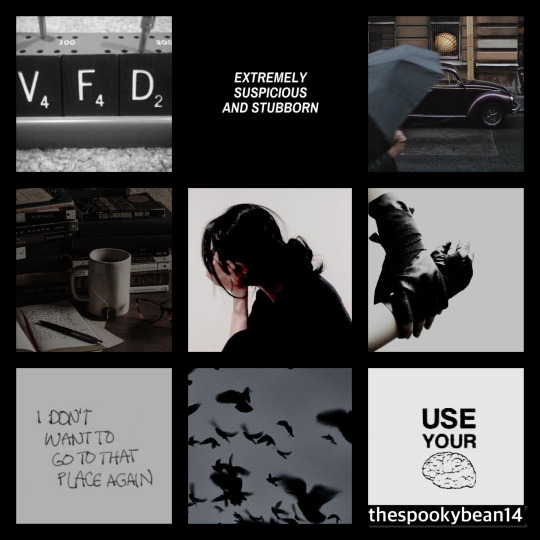
Luke Crain [He/Him]:
Age: 33
Profession: Artist; Arsonist(?)
Side of VFD: Firefighter and Firestarter; Defected/N/A (currently)
Quote: "Big boys know the difference between what's real and imaginary."
Status/Last Seen: Alive; somewhere on Mount Fraught

Eleanor Crain [She/Her]:
Age: 33
Profession: Librarian
Side of VFD: Firefighter (formerly); Defected/N/A (currently)
Quote: “Our moments fall around us like rain.”
Status/Last Seen: Alive; walking through The City with four children who may or may not be The Baudelaires
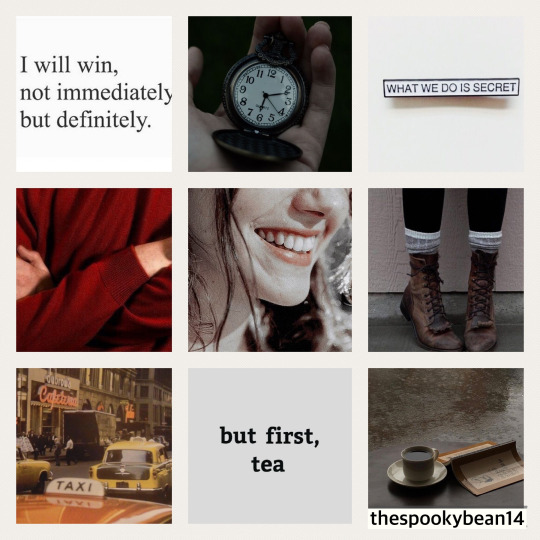
#thespookybean14#the haunting of hill house#spooky faves#moodboards#alternate universe#hill house au#a series of unfortunate events#asoue#a series of unfortunate events au#steve crain#shirley crain#theo crain#luke crain#nell crain#the baudelaire children#lemony snicket#aesthetic
9 notes
·
View notes
Note
what's a fictional character u would say you're most like/relate to???
p.s. i'm sorry ur having a rough time.. if u need/want to talk, don't hesitate to hit me up in DMs. i've been missing u (yes, ik that's weird, but i sincerely don't mean it in a weird way at all). if i can do anything for u, lmk ♡
hey honey <3 miss you too.
i’d have to say a couple stand out.
luke & nell crain / haunting of hill house
nicky nichols / orange is the new black
sam carpenter / scream
victor salazar / love, victor
yelena belova / black widow
loved this question, thank you.
4 notes
·
View notes
Text
Tagged by @paradisechid800 Thanks!
What fictional character(s) are you completely obsessed with and would possibly commit serious felonies for?
Me:
-Bigby Wolf (The Wolf Among Us)
-Snow White (The Wolf Among Us)
-Bruce Wayne (specifically The Batman 2022 and Telltale Games)
-Selina Kyle (also 2022 movie and Telltale)
-R Atvist (Warm Bodies)
-Luke Crain (The Haunting of Hill House)
-Titus Andromedon (Unbreakable Kimmy Schmidt)
-Sebastian Michaelis (Black Butler)
-Thomas Howard (The Lighthouse)
-Susan Ashworth (The Cat Lady)*
-Nadia Vulvokov (Russian doll)
-Lucifer Morningstar (Lucifer)
*All the characters made by Harvester Games, actually.
Tagging: @nightwingthesamuraifool @sentimentalities @girlnovels @uwucthulu @thedumbbrunette0-0 @chicowitch @goldenstripes001 @mswyrr @nervousloveheart
4 notes
·
View notes
Text
@yuriappreciationsquad and @itissnowing tagged me for my top 10 characters! in no particular order, but also in some sort of vague order.
Eleanor Crain from The Haunting of Hill House show
Guillermo de la Cruz from the WWDITS show
Luke Skywalker. you know, from the Star War.
James Flint from Black Sails auf...
Chidi Anagonye from The Good Place
Alec and Ellie from the show Broadchurch; I think they deserve to go together like a pack. DO NOT SEPARATE!!
Jon Sims from The Magnus Archives. I'm also allowed to include Martin Blackwood from the same thing. do not separate them either...
The Professor from La casa de papel/Money Heist... The grip that man had on me
Robin Buckley from Stranger Things
L from Death Note. I almost forgot this little whore because he's so fundamental to my heart it felt like a much too obvious thing to name him.
I tag, if they would like to, @harlequinsprites @transgendergerardway @beyond-birthday @5percentkira @waterandsilver @thesoupisburning and whoever else wants to do it who I was too shy to tag, but if they want to do this they're going to have to make their own post because I made this unrebloggable because I'm embarrassed. but I looove putting my favorite fictional guys in lists. lol.
5 notes
·
View notes
Text
REDO: Panel Presentation on the Haunting of Hill House
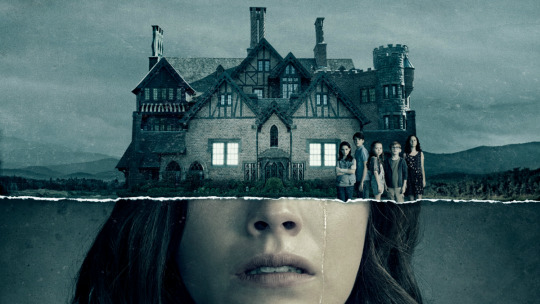
In “We’re Going to Make You into a Proper Woman: Postfeminist Gender Performativity and the Supernatural in Penny Dreadful,” Pedro analyzes two female protagonists and the supernatural “dark forces” inside of them–their “uncanny doubles.” She critiques the show’s lack of liberation for its female protagonists, as they are framed as hysterical, lack agency, and are eventually punished (one dies, the other lives in hiding) (Pedro, 2021). This frames the womens’ social deviance (in the form of their supernatural “doubles”) as un-emancipating and thus reinforces traditional gender norms. The Haunting of Hill House similarly explores the “uncanny doubles” (supernatural spirits) that haunt Olivia and Nell Crain (mother and daughter), and eventually result in their death. The show surrounds the reunion of the 4 remaining Crain children and their father (Hugh) for their sister Nell’s funeral. During this reunion, we learn of the family’s complications, all of which are tied to a summer spent at Hill House ~30 years ago, during which the family matriarch (Olivia, Hugh’s wife) was driven to hysteria, attempted to kill her children, and committed suicide.
The show provides information about the Cain family members’ individual character transformations through its editing style, in which flashbacks to 1) ~30 years ago at Hill house and 2) the recent past–prior to Nell’s death, are interspersed throughout the present (Nell’s funeral). Each episode focuses on one character’s perspective, and reveals their individual childhood experiences at Hill House in relation to their current adult lives. I (mainly) focus on Episode 5, in which Nell’s perspective is shown through flashbacks, and the supernatural forces behind her death are revealed.

What concepts of Gothic doubling function to define the natural from the supernatural?
Gothic doubling takes the form of Freud’s “uncanny” as it represents the characters’ “repressed traumas," an idea that is supported by Nell’s double, a spirit called the Bent Neck Lady (who we later learn is Nell), and Luke's double, a spirit called the Tall Man. To clarify, Luke is Nell’s twin brother and the second most affected child.
Ghosts directly differentiate the natural and supernatural, as everything but these doubles and the spirits of Hill House align with the ‘natural’ world, where ghost stories are immediately deemed fiction. Nell and Luke's social alienation is tied to their connection to (or, haunted-ness by) the supernatural, which takes the form of their gothic doubles/ghosts and is framed as representative of their childhood trauma; editing through flashbacks reveals that these spirits emerged at Hill House, and confirm the tie between the supernatural and trauma. At points where Nell and Luke take a step toward fulfillment and leaving their trauma behind (ex. when Nell is engaged and Luke is sober), their gothic doubles' appearances decrease. However, as soon as their doubles return and repressed trauma reemerges, the tone of the natural world seems to disappear, and they are immersed back into the dark, cool, gloomy world of the supernatural/Hill House. The brightness and warmth during a set of scenes at Nell's engagement party contrast with moments where the Bent Neck Lady appears, and the world feels blue. Luke also exemplifies this in a scene where he walks the streets alone (without his now ex-girlfriend), an addict, his face scratched and dirty--the fact that he's using is visually evident (Episode 4). It's clear that he's at a low point, which is tied to the supernatural through the appearance of his double, the Tall Man, behind him.
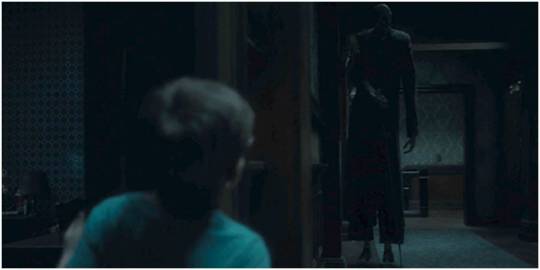

Photo(s): the photo above is Luke as a child--the camera angle highlights the Tall Man's dominance over him--and the photo below depicts the scene described above.

In what ways is gender performativity tied to the supernatural?
Eleanor’s deviance from gender performativity is directly connected to the supernatural, as she must adopt feminine submissiveness in order to please those around her despite an ever-present fear of the Bent Neck Lady, who never ceases to validate this fear by surprising Nell with a visit--even when she least expects it. This spirit’s recurring appearances cause Nell sleep paralysis an inability to move past her childhood haunting, which result in her social withdrawal. Similar to Vanessa in Penny Dreadful, who Pedro notes played with dolls to avoid being viewed as “deviant,” Eleanor performs gender by keeping her supernatural struggles to herself to avoid being labeled as hysterical (Pedro, 2021). Even when she finds a loving fiancé who tries to help her and Lady's visits decrease, she still suffers, yet stops discussing it with her family to avoid being viewed as “somehow abnormal”; she fears that they will “punish her for" deviating from gender norms of normalcy by invalidating her as mentally ill, which occurs in Episode 5 (Pedro, 2021). Pedro suggests that female characters are punished for defying femininity through the supernatural, and that they resultantly adopt a “compliant” obedience–they are (superficially) made “normal” despite their inner turmoil, illustrating a clear instance of gender performativity (Pedro, 2021).
How does the series use the supernatural to liberate characters from oppressive normalcy?
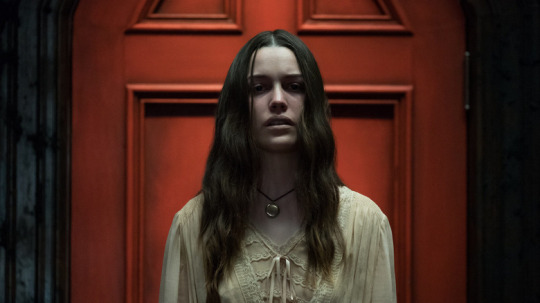
Photo: Nell's physical deterioration (her paleness, lack of color, and blue undertones) align with her mental health as the uncanny double takes over, leading her 'home' before trapping her there forever.
Pedro states that “madness” and “supernatural possession” liberates characters from oppressive, gendered normalcy, as is evident in Nell’s eventual ignorance of her siblings’ dismissive attitudes toward her (Pedro, 2021). Nell physically “struggles against her gothic double,” like Vanessa in Penny Dreadful, which is evident in her increasingly deteriorating physicality up until her death, at which point she assumes the forever hanging, broken-neck form of the Bent Neck Lady (Pedro, 2021). She eventually gives up, at which point she seemingly “embraces” her double and returns to Hill House and the mother she lost (her trauma). However, this stray from normalcy and acceptance of her "darkness" is framed in a negative way, as Nell “becomes” her true self (the Bent Neck Lady), but only after she is murdered by her mother; Nell’s gothic double is framed as “unrestrained” in a way that is harmful rather than liberating based on her final death (Pedro, 2021). The scene where Nell falls to her death is extremely emotional through its framing of scenes (we had already seen) from Nell's childhood, but shifting it to be from the Bent Neck Lady's perspective. Nell is a "fallen woman" who will be punished for her transgression from normalcy for eternity (based on times lack of linear form).
Additionally, moments before Death, Olivia blurs Nell's view of Hill House. Olivia hallucinates beauty and the presence of her family members, who smile warmly despite their recent coldness, and her dead fiancé--this is heightened by the presence of bright, warm colors, such as red and orange, which contrast with the darkness behind this illusion. Nell only wakes up when it's too late, as her mother immediately pushes her to her death. This frames Hill House and the supernatural as non-liberating, as the oppressive normalcy of female lack of agency is highlighted through Nell's naive obliviousness as she walks to her death.
Nell's Death (TRIGGER WARNING: Stop Before 1:35)
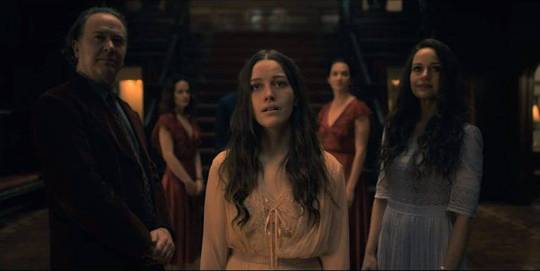
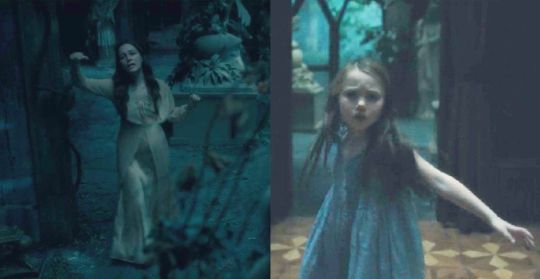
Photo: what her mother/the house/the "supernatural" makes Nell see vs what we see--where she really is (her naivety is highlighted through the scene's visual form, which is almost identical to a scene during her childhood, depicted on the right)
In what ways do Gothic doubles allow characters to transgress scripted gender that society imposes on them?
Despite her eventual punishment, Nell’s gothic double enables her to transgress scripted gender roles as it fires an “anger and pain” within her that she uses to stand up against patriarchal gender norms (Pedro, 2021). Scripted norms of femininity are imposed upon Nell by her brother, Steven, who views her expression of the supernatural to be "the ramblings of a madwoman" (Pedro, 2021). However, it seems as though this demonization is a result of his inability to embrace her superiority, mainly because he was excluded from experiencing the ghosts that his siblings did--a threat to male authority (Pedro, 2021). The Bent Neck Lady’s prominence in Nell’s life makes her the most affected of the Crain children, and as the double’s appearances increase, so does Nell’s own transgression from femininity. Steven, who had minimal supernatural experiences at Hill House and lacks a gothic double, writes a book series on his siblings’ trauma, profiting despite his own labeling of both Nell and his mother as “hysterical” and mentally ill (which Pedro notes are gendered insults) (Pedro, 2021). At the height of her grief and haunted-ness at the hands of her gothic double, Nell stands up against Steven by crashing his book signing; she exposes his “privilege” for selling her trauma in front of all of his fans (Episode 5). In this way, her double's emergence places Nell in a position of power--the entire audience listens to her--and enables the possibility of female “social transgression” and “freedom of speech and action” through her self-expression (Pedro, 2021)
Nell Takes a Stand

Photo: Steven holding one of his books from the series.
How are characters rewarded or punished for subverting their expected character traits?
Just as Pedro notes in the reading, the supernatural as a subversion of gender norms can be used to empower women, but this series fails to do so, and instead punishes the two most significant characters. While Olivia is initially framed as a warm, loving mother, her manipulation at the hands of Poppy Hill (an evil spirit of Hill House) quickly leads to her “possession” and the eventual murder of an innocent little girl (from the neighborhood). Her husband comes to the rescue and sweeps their children out, purposefully not even letting them see their mother, who is immediately framed as a monster. While Pedro notes that a “supernatural possession” (frequently viewed as hysteria) can be a form of subverting traditional gender norms, Olivia’s defiance of “passivity” through possession is harmfully grouped with her murderous plan, framing her as hysterical despite Poppy’s role in her plan. Moreover, her endless entrapment in Hill House is framed as fair, which is confirmed when she murders Nell years later. The fact that she murders Nell only further overpowers her victimization and instead frames her as a bad mother, especially because it remains unclear whether she is still possessed or, at this point, acts autonomously. Olivia is grouped with Poppy Hill, her “uncanny double,” and is punished for her “madness” rather than being able to use it in a more feminist way--in fact, she uses it against her own female child (Pedro, 2021).
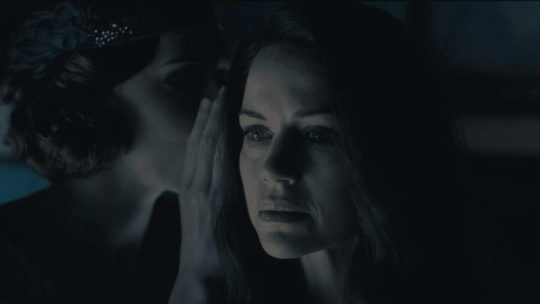
Photo: Poppy Hill (spirit of Hill House) urges Olivia to "wake her family up" from the nightmare of life--to kill them, keeping their spirits 'alive' and 'safe' in Hill House, forever.
youtube
Critical Thinking Questions:
Do you think that Nell and Olivia are victims, villains, or neither?
Hill House is framed as a place where time is non-linear, which enables the characters (Nell) to interact with themselves in different time periods. How is this meaningful in relation to confronting their trauma?
In the end of the show, Hugh sacrifices himself, fully calming Olivia down and enabling his children to escape from Hill House. Do you think his heroism overshadows the horrible fates of the female protagonists?
Nell's constant anxiety is only truly resolved when she returns to Hill House, the source of her trauma. In response to this, do you view her ending as closure instead of punishment/torture?
#oxyspeculativetv @theuncannyprofessoro
0 notes
Text
Comment The Old Republic va-t-il nous faire ressentir les sabres laser ?
Comme la plupart des fans de Star Wars, j'ai toujours été fasciné par le sabre laser.
Je pense que je suis tombé amoureux d'eux pour la première fois lorsque Luke et Vader se sont battus dans la Sky City sur Bespin.
Il y a quelque chose de cool indéfinissable dans un sabre laser qui est difficile à décrire.
La lame incandescente qui lui donne une présence visuelle distincte et le bourdonnement étrange de bas niveau qui promet une mutilation et/ou un démembrement parfumé à l'ozone.
Et bien sûr, la vue et le son impressionnants de deux sabres laser qui se frappent, envoyant des étincelles voler dans tous les sens, avec un son qui ne laisse aucun doute sur le potentiel mortel de ces armes.
Enfin, les sabres laser sont des armes très rares dans Star Wars.
Ils sont portés par des guerriers d'élite ressemblant à des samouraïs qui les utilisent avec des compétences expertes qui les rendent beaucoup plus meurtriers qu'un soldat avec un blaster commun.
Tout cela a fait des sabres laser l'arme de science-fiction la plus reconnaissable de l'histoire du cinéma.
Sans cesse parodié et copié dans d'autres films, jeux et divers autres médias.
The Old Republic n'est pas le premier jeu à nous laisser jouer un personnage brandissant un sabre laser.
Cela a été fait à plusieurs reprises auparavant avec divers degrés de succès dans des jeux comme la série Jedi Knight et Knights of the Old Republic.
J'ai eu un problème avec la façon dont les sabres laser ont été représentés dans presque tous les jeux auxquels j'ai joué.
C'est un simple problème d'équilibre du jeu par rapport à rester fidèle à la fiction.
Dans les films Star Wars, un sabre laser peut couper à peu près tout en un seul coup.
Il se fera un plaisir de démembrer les personnes/extraterrestres/droïdes ou de couper à travers un évent sur le dessous d'un AT-AT.
Cependant, dans presque tous les jeux Star Wars auxquels j'ai joué, vous ne pouvez pas tuer vos ennemis en les frappant simplement une fois avec la lame.
Cela a du sens du point de vue de l'équilibrage du jeu bien sûr.
Il devient vraiment difficile de rendre un jeu difficile pour le joueur, s'il peut juste courir et se balancer une fois pour tuer l'ennemi.
Néanmoins, cela a toujours déprécié la sensation des sabres laser pour moi, les faisant se sentir moins comme une arme d'une puissance incroyable et à peine exploitée, et plus comme un bâton lumineux avec lequel vous frappez vos ennemis autour de la tête et du cou.
Bien sûr, ce sera à peu près la même chose pour The Old Republic, à en juger par tout ce que j'ai vu jusqu'à présent.
Et je peux accepter cela au nom de l'équilibre, même si cela me rend un peu triste.
Ce qui m'inquiète le sabre laser neopixel plus, et ce qui est unique dans The Old Republic, c'est la prolifération des sabres laser auxquels nous allons être exposés.
Pour moi, le fait que les sabres laser et les utilisateurs de force en général soient rares les a toujours rendus plus intéressants et fascinants.
Avec The Old Republic, il est très probable que nous verrons au moins la moitié de la base de joueurs utiliser un personnage brandissant un sabre laser (à moins que les gens ne s'éloignent d'une manière ou d'une autre de ces classes, mais je ne vois pas pourquoi cela se produirait. Probablement le contraire est plus probable ).
Cela signifie que dans un groupe de quatre joueurs donné, vous verrez probablement deux sabres laser à un moment donné.
Sortez sur la place du Sénat sur Coruscant et la moitié de ces 200 personnes arboreront un sabre laser.
En bref, vous verrez beaucoup de bâtons lumineux et je crains que cela ne ruine simplement certains des « ouais, génial !
1 note
·
View note
Text
hill house really fucked me up—like how they moved in and olivia said, ‘you guys go on without me’ and them being soulmates, hugh was all like ‘how could we?’ but then on their last night they literally had to go on without her and spend the rest of their lives that way wHO ALLOWED THIS
326 notes
·
View notes
Link
"So, of course, hush, of course, wonder.
And when they guide you up the steps
to gaze into a field of mirrors,
There can be no doubt that what you're looking at
is life, and when you turn back into the dark,
it's either the future of the past,
But most probably it's death." —Tishani Doshi
Hill House Five by Quipxotic
Fandom: Doctor Who/The Haunting of Hill House
Rating: General audiences
Characters: Fifth Doctor, Nyssa of Traken, Tegan Jovanka, Hugh Crain, Olivia Crain, Luke Crain, Eleanor "Nell" Crain, Theodora "Theo" Crain, Steven Crain, Shirley Crain, Poppy Hill, Horace Dudley, Clara Dudley
Fog shrouded the house and its hills, making all the normal early morning sounds seem distant and unreal. Hidden among the bird song and hum of cars traveling to and from the nearby town, there was another sound - the wheezing of a different kind of vehicle as it materialized.
Engines thudded and the light on top of the police box dimmed as the TARDIS landed in the forest. The door opened and a blonde young man in a cricketing outfit hurried out. “Let’s see,” the Fifth Doctor held up a small device that beeped periodically. He turned slowly in place until the sound became stronger. “This seems to be the direction.” He glanced impatiently behind him before striding forward. “Tegan? Nyssa? Hurry up, I don’t want to lose the trace.”
Read "Hill House Five" by Quipxotic on AO3.
#doctor who#the haunting of hill house#fifth doctor#nyssa of traken#tegan jovanka#hugh crai#olivia crain#luke crain#nell crain#theo crain#steven crai#shirley crain#poppy hill#horace dudley#clara dudley#fic#prompt fill#poetry fiction
4 notes
·
View notes
Text
Idk why but I’ve got a feeling that everyone hating on Steve and Shirley Crain is definitely not an eldest sibling.
#thohh#the haunting of house hill#shirley crain#steve crain#they were such a 'big sibling' mood both of them#steve constantly trying to comfort the twins as kids and then struggling to do so when they are adults with more complicated issues#shirley going as far as humanly possible to try to help luke nell and theo have healthy happy lives#pay for luke's rehab watching over nell's wedding and trying to get theo to open up instead of doing only one night stands#steve just giving luke money when he finds him robbing him without even getting mad#both of them doing their damn best to live functional adult lives despite the horrors of their childhood to maintain some sense of#normalcy and help their siblings through the trauma in any possible way they can#shirley calling steve out for not looking after them all as a big brother even though as an adult he should no longer feel responsible for#all of them and shirley taking on the big sister role as so many sisters do specially after losing their mother#also like the thing with steve and the book and the family getting mad at him?#like that was the most realistic writer conflict i've ever seen#steve needed to write about his trauma to process it and like most of the great writers in the world do this and yeah ofc people#get upset about it but also writers gotta use the material of their lives to create and then he put it into fiction or what he thought was#anyway i love all of the crain siblings but i will protect this two with my life#sofia's nonsense
118 notes
·
View notes
Text
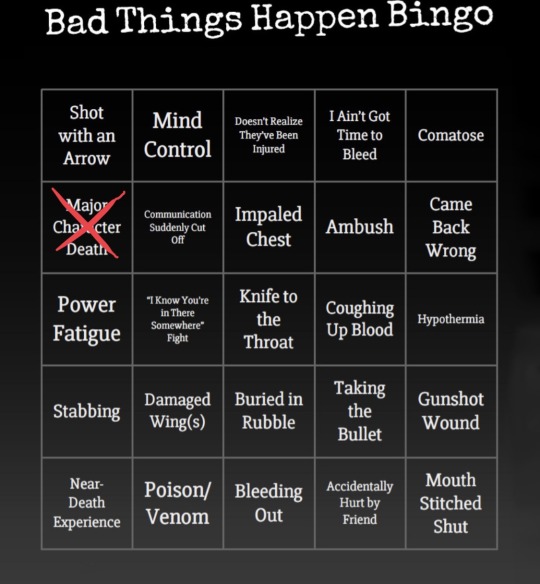
Prompt: Major Character Death (@badthingshappenbingo)
Fandom: The Haunting Of Hill House
Summary:
“Let them go.” He repeats, begging, praying that it would be enough.
His mother smiles at him, all sharp edges and lips stretched too wide.
“You’ll stay with me?” she asks.
He nods, and she draws him in.
Steve closes his eyes.
He feels icy fingers against his back, barely touching but pushing all the same, and he allows his mother to pull him forward.
Or,
Things go differently at the Hill House.
#haunting of hill house#steve crain#nell crain#hugh crain#olivia crain#luke crain#shirley crain#theo crain#bad things happen bingo#whump#fiction#my fic
3 notes
·
View notes
Photo

The Man In The High Castle (2016)
“The future belongs to those who change it.”
#2016#film#series#TV show#television#science fiction#WWII#alternate history#The Man In The High Castle#Rufus Sewell#Obergruppenführer John Smith#John Smith#Alexa Davalos#Juliana Crain#Luke Kleintank#Joe Blake#Cary-Hiroyuki Tagawa#Nobusuke Tagomi#The Statue Of Liberty#New York#New York City#NYC#Greater Nazi Reich#San Francisco#Imperial Japan#Philiph K. Dick
4 notes
·
View notes
Text
ummm dont talk to me unless youve read
Effeminate England: Homosexual Writing After 1885 by Joseph Bristow; Secret Selves: Confession and Same-Sex Desire in Victorian Autobiography by Oliver Buckton; Sacred and Profane in Symbolist at the Art by Luigi Carluccio; Virtuous Vice: Homoeroticism and the Public Sphere by Eric Clarke; Nameless Offences: Homosexual Desire in the Nineteenth Century by H. G. Cocks; Talk on the Wilde Side by Cohen; An Introduction to Logic and Scientific Method by Morris R. Cohen, Ernest Nagel; Sex Scandals: The Private Parts of Victorian Fiction by William Cohen; London and the Culture of Homosexuality, 1885–1914 by Matt Cooke; Family Likeness: Sex, Marriage, and Incest from Jane Austen to Virginia Woolf by Mary Jean Corbett; American Sympathy: Men, Friendship and Literature in the New Nation by Caleb Crain; Emulation: Making Artists for Revolutionary France by Thomas Crow; Love Revealed: Simeon Solomon and the Pre-Raphaelites by Colin Cruise; Queer Beauty: Sexuality and Aesthetics from Wincklemann to Freud and Beyond by Whitney Davis; Friendship's Bonds: Democracy and the Novel in Victorian England by Richard Dellamora; Masculine Desire: The Sexual Politics of Victorian Aestheticism by Richard Dellamora; "Beautiful, Aesthetic, Erotic." The New York Review of Books by Richard Dorment; Romantic Genius: The Pre-History of a Homosexual Role by Andrew Elfenbein; British Aestheticism and Ancient Greece: Hellenism, Reception, Gods in Exile by Stefano Evangelista; The Trials of Oscar Wilde: Deviance, Morality, and Late-Victorian Society by Michael S. Foldy; The History of Sexuality: An Introduction (Volume I) by Michel Foucault; Queer Dickens: Erotics, Families, Masculinities by Holly Furneaux; Idylls of the Marketplace: Oscar Wilde and the Victorian Public by Regenia Gagnier; Selected Poetry by Johann Wolfgang Goethe, David Luke; The Story of Art by E. H. Gombrich; Queer Others in Victorian Gothic: Transgressing Monstrosity by Ardel Haefele-Thomas; Homosexual Desire by Guy Hocquenhem; "Burne-Jones and Gustave Moreau." Horizon: A Review of Literature and Art by Robin Ironside; The Homosexual Revival of Renaissance Style, 1850–1950 by Yvonne Ivory; The Symbolists by Philippe Jullian; Observations on the Feeling of the Beautiful and Sublime by Immanuel Kant, John T. Goldthwait; Sexual Justice: Democratic Citizenship and the Politics of Desire by Morris B Kaplan; Sodom on the Thames: Sex, Love, and Scandal in Wilde Times by Morris B Kaplan; Painted Men in Britain, 1868–1918: Royal Academicians and Masculinities by Jongwoo Jeremy Kim; Between Women: Friendship, Desire, and Marriage in Victorian England by Sharon Marcus; The Other Victorians: A Study of Sexuality and Pornography in Mid-Century Britain by Steven Marcus; Pleasures Taken: Performances of Sexuality and Loss in Victorian Photographs by Carol Mavor; The Last Pre-Raphaelite: Edward Burne-Jones and the Victorian Imagination by Fiona MacCarthy; "The Homosexual Role." Social Problems 16.2 by Mary McIntosh; Victorian Keats: Manliness, Sexuality, and Desire by James Najarian; Walking the Victorian Streets by Deborah Epstein Nord; Catholicism, Sexual Deviance, and Victorian Gothic Culture by Patrick O'Malley; The Place of Enchantment: British Occultism and the Culture of the Modern by Alex Owen; The Renaissance by Walter Pater; Flesh and the Ideal: Winckelmann and the Origins of Art History by Alex Potts; Art for Art Sake's: Aestheticism in Victorian Painting by Elizabeth Prettejohn; Art of the Pre-Raphaelites by Elizabeth Prettejohn; Beauty and Art: 1750–2000 by Elizabeth Prettejohn; Beauty's Body: Femininity and Representation in Victorian Aestheticism by Kathy Alexis Psomiades; Art and Homosexuality: A History of Ideas by Christopher Reed; From Realism to Symbolism: Whistler and His World by Allen Reff, Staley Theodore; Men in Wonderland: The Lost Girlhood of the Victorian Gentleman by Catherine Robson; Edward Carpenter by Sheila Rowbotham; Between Men: English Literature and Male Homosocial Desire by Eve Kosofsky Sedgwick; The Epistemology of the Closet by Eve Kosofsky Sedgwick; Sexual Anarchy: Gender and Culture at the Fin de Siècle by Elaine Showalter; The Wilde Century: Effeminacy, Oscar Wilde, and the Queer Moment by Alan Sinfield; Aubrey Breadsley: Dandy of the Grotesque by Chris Snodgrass; Postal Pleasures: Sex, Scandal, and Victorian Letters by Kate Thomas; Cities of Dreadful Delight: Narratives of Sexual Danger in Late-Victorian London by Judith Walkowitz; "Queer and Then?." Chronicle of Higher Education by Michael Warner
68 notes
·
View notes
Note
Have you noticed the thing in fanfics of children's lit where the writer gives the protagonist new parent figures? The parent figures say things like "no child should have had to do x!". PF's don't prevent protagonist from doing heroism but might ground them for it after. Under their care, the protagonist is likely to get a job, often at the business of the PF. Seems less common for the Animorph (more in ATLA and Harry Potter), but if you have seen this, what's going on? Why do writers do this?
Why do writers do this?
Welcome to the fandom renaissance, Nonny! My best stab as to what’s going on here is that we’re seeing fewer and fewer shipping wars due to a whole range of forces from “the average age of fandom is increasing” to “there’s an ongoing post-monogamy societal shift.” BUT that there’s still a desire to see relationship-building fic go in the gaps where (for instance) Pro-Jacob Anti-Edward fic used to go. So instead of writing about Edward and Bella’s romance, people are writing about Edward and Carlisle’s mentorship, or Leah and Rosalie’s friendship.
What’s going on?
Again, a stab in the dark: it’s a really fun story premise, one that can get away from the way ships are sometimes fraught with baggage. Found Family is intensely cathartic, in the sense that it takes characters who are miserable and/or lonely in canon and allows them to build loving relationships with each other. It also (IMHO) reflects that trend among Millennial Whippersnappers to move away from nuclear definitions of “family” and toward embracing everything from polyamory to sexless romance to adult adoption.
Not only that, but it’s awesome in that it lets writers play so much with foils. Stranger Things obviously does this Up to Eleven (pun intended): Steve’s an arrogant jerk when he’s interacting with Nancy but a dorky sweetheart around Dustin, Hopper’s at his worst around Joyce but at his best around El, Billy’s evil to Max but might be redeemable around his mom, etcetera. This premise gives fan writers the chance to get wildly different characters into a room together — what if the Tonks family adopted Neville Longbottom? — and start playing out the fun potential.
Why Avatar and Harry Potter (but not Animorphs)?
In a word: FOILS. Both AtLA and Harry Potter are series filled with good, bad, and ugly mentors, and both series have contrasts between the good and the bad. For AtLA, it’s no accident that Zuko finally reuniting with his father in S3E1 is intercut with the scene of Katara finally reuniting with her father. Katara’s fam airs their grievances, talks things out, yells, cries, apologizes, forgives, hugs, and affirms their ongoing love. Zuko’s fam deals with having 500 times as much baggage by... Zuko kowtowing silently on the floor while Ozai talks about everything but their problems with each other. After that sequence, the desire to get Zuko into a room with Hakoda for some proper fathering is practically overwhelming, and many brilliant fan writers have obliged us by doing exactly that.
For Harry Potter, there’s no scene that’s as in-your-face with the contrast between healthy vs. unhealthy disagreement with one’s father, but there are still plenty of mentor foils. Sirius and Petunia are probably the clearest examples. Sirius is a raging mess who (on the surface) has nothing to offer Harry: he’s an ex-con with a drinking problem and untreated mental health issues who spends much of the series homeless. Petunia has her shit together and (on the surface) is the perfect guardian for Harry: she’s a wealthy full-time parent who lives in a large suburban house, and is both his closest surviving relative and his legal guardian. But of course all Harry needs from a parent is love and support, and Sirius offers that in spades while Petunia has none to spare. Again, the desire to rip Harry away from the Dursleys and ship him off to go be a Black is overwhelming, and many beautiful works of fan fiction have done exactly that.
Animorphs... doesn’t have mentor characters. Like, none. Elfangor dies, Toby does her own thing, Erek can’t be trusted, neither Ax nor Jake wants to mentor, and all adults are possible controllers. Eva’s the closest we get, but by the time she’s free, everyone (especially Eva) recognizes that the Animorphs are already more experienced than her. We don’t even see a dynamic like the Teen Titans show where the villains mentor the heroes — Jake and Marco might occasionally parallel Visser Three and Visser One, but they don’t learn from the vissers the way that Robin does from Slade or Raven does from Trigon. The kids just... find their own way. So while people have written fic where Elfangor or Eva or Mertil or Tom mentors the team, there’s not this in-your-face missed opportunity for the kids to get the parenting they deserve in Animorphs the way there is with Harry Potter and Avatar.
Have you noticed the thing?
Personally, I love this trend. I’m not much of a shipper — I’m not fond of “will they or won’t they” romantic premises, and actively dislike “they will because they’re soulmates” premises. My favorite Ship Dynamics are all platonic. Like, my faves include (but are not limited to):
Grubby Semi-Feral Mentee and Aloof Socially-Incompetent Mentor Bond with Alarming Speed Over Niche Magical Interest (see: Briar and Rosethorn in Circle of Magic, Boy 412 and Marcia in Septimus Heap, Jason and Bruce in Batman, Wart and Merlin in The Once and Future King)
Well-Intentioned Loving Parent Irretrievably Fucks Up Child, Copes with Fallout (see: John and Dean in Supernatural, Adam and Cal in East of Eden, Soichiro and Light in Death Note, Elaine and T.J. in Political Animals)
I’ve Only Known This Person With Extremely Specific Shared Trauma for 10 Minutes But If Anything Happened to Them I Would Kill Everyone (see: Toph and Zuko in AtLA, Luke and Annabeth in Demigod Diaries, Ax and Tobias in Animorphs, Spike and Angel in Angel, Parker and Eliot in Leverage, Johanna and Finnick in Catching Fire)
Saving the World Sucks But At Least My Ultra-Competent Siblings Are Suffering With Me (see: Edmund and Lucy in Chronicles of Narnia, Sam and Dean in Supernatural, the Hargreeveses in Umbrella Academy, the Crains in Haunting of Hill House)
Just Because I Tried to Kill You That One Time Doesn’t Mean I Won’t Help You Hide a Body, JFC We’re Still Family and I Don’t Know What You Take Me For (see: the Robins in Batman, Septimus and Simon in Septimus Heap, Kyle and Ian in The Host)
We Were the Weird Cousins At All the Family Reunions and We’ve Only Gotten Weirder Since (see: Kate and George in Story Time, Jake and Rachel in Animorphs, Po and Bitterblue in Graceling Realm)
#fan fiction#animorphs#animorphs meta#animorphs fic#animorphs fandom#fan meta#fandom#harry potter#avatar the last airbender#ship dynamics#found family#atla#Anonymous#ask#mentoring#i write sibs not romance
192 notes
·
View notes
Note
I hated Hill House because they made the writer in the show a man when the book is an iconic piece of women’s horror fiction. Honestly it infuriated me then and every time I think about it I get mad again lol
this is interesting bc i understand where you’re coming from but i actually personally really disagree! steve is not meant to be seen as the Author of the story itself, but his chosen mode of processing is Distance and authorial objectivity. he never saw the ghosts, so his way of categorizing his childhood and personal trauma is through fiction. steve’s profession is a way for him to be in a constant state of denial.... the transformation by the end when his voiceover is wrapping up the show: it’s the first time he’s writing from a place of honesty (and it’s his way of carrying on his father’s legacy of Knowlege and protection through distance, now that his dad is gone).
i really think the season does huge justice to shirley’s work and her themes and just because there’s a man writing doesn’t mean the inference is supposed to be that steve is somehow lauded for this or is meant to replace shirley. the show is about the women of the crain family - the way mental illness is passed down between generations but also the way that gifts are passed in the same way... the crain women are the beating heart of the family and the show (even the ghosts who are given shape and voice are all women). i would argue that liv and the twins are the “main characters” although it’s truly an ensemble. luke is the exception because of his connection to nellie but by and large the women are left to constantly confront and deal with the horror of the house (and the inherent horror of domesticity/the home that shirley dealt with so often) while the men (hugh and steve) chose to disconnect themselves from what the women could not (steve through skepticism and fiction, hugh with actual distance).
idk i’m not gonna make this a paper of the themes of the book vs. the show BUT i think this is an interesting reaction!! i just don’t think that the mere fact that steve is an author is placing him in the Shirley Role, and that the narrative of the story itself shows that this is women’s horror and larely women’s stories being told.
#i totally totally get it but that wasn't my take at all!!#long post //#thohh#Anonymous#sorry i typed this in the middle of work so its not fully formed but
87 notes
·
View notes